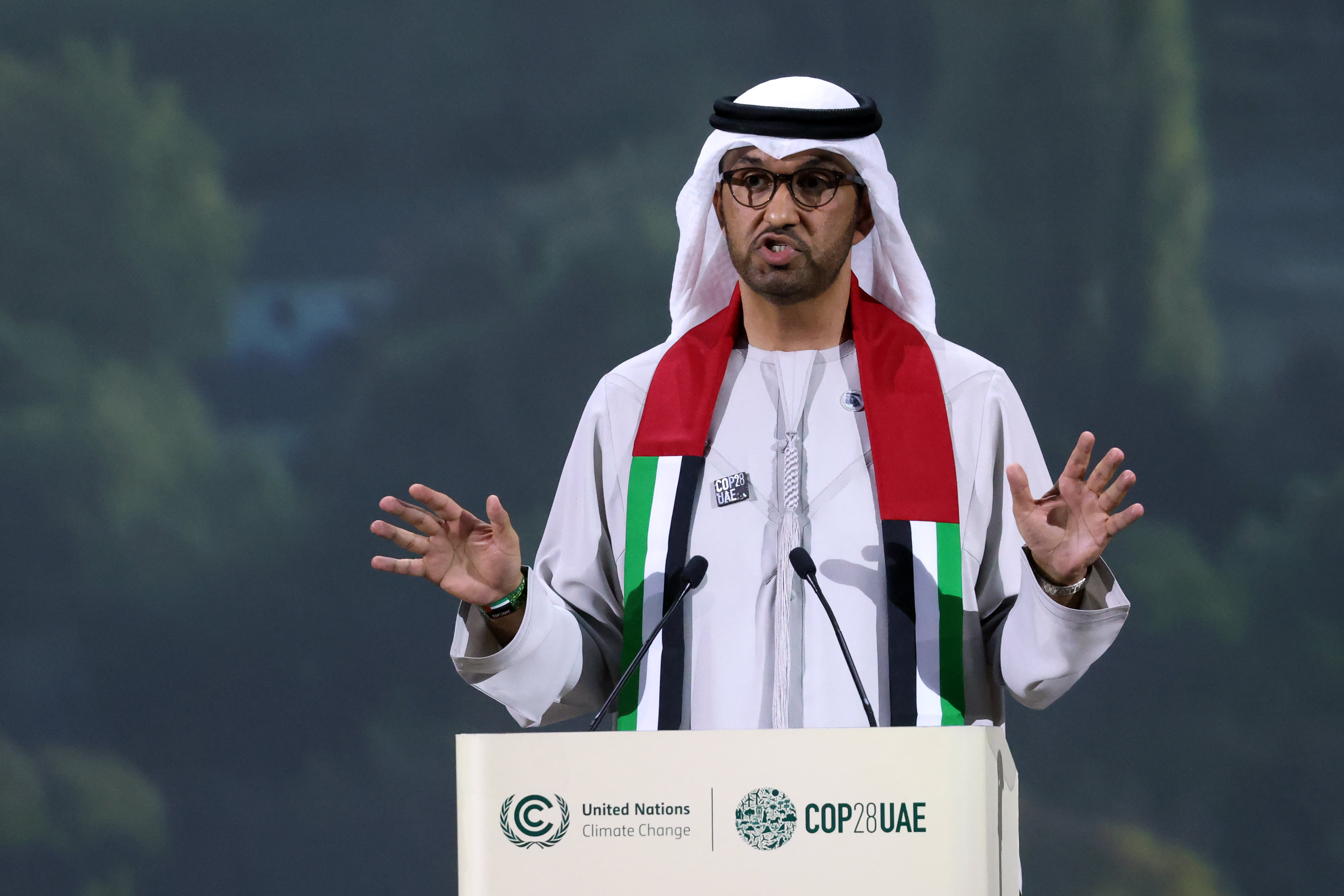
Dubai, UNITED ARAB EMIRATES — COP28 President Sultan al-Jaber is facing a backlash over his claim that there is “no science” behind calls for a phase out of fossil fuels — a demand that many believe will ultimately determine the success of the United Nations climate conference.
In comments first reported on Sunday by The Guardian and investigative journalism organization the Centre for Climate Reporting, al-Jaber, COP28 president and United Arab Emirates climate chief, suggested a fossil fuel phase out would not allow sustainable development “unless you want to take the world back into caves.”
The remarks, which were made by al-Jaber during a live online event on Nov. 21, have been described by scientists and advocates as “farcical,” “beyond astonishing” and verging on climate denial.
In a social media post, University of Pennsylvania climate scientist Michael Mann accused al-Jaber of “making a complete mockery” of the COP28 talks and urged U.N. chief Antonio Guterres to speak out on the issue.
Al-Jaber was seen as a controversial choice to lead COP28 discussions in Dubai given that he also works as the head of the state-run Abu Dhabi National Oil Co.
Speaking at a news conference on Monday, al-Jaber said his team “very much believe and respect the science.” He added that he’d been surprised by the “constant and repeated attempts to undermine the work of the COP28 presidency.”
Separately, a spokesperson for COP28 told CNBC that al-Jaber has been “unwavering” in saying that keeping global warming to 1.5 degrees Celsius involves action across a number of areas and sectors.
“The COP President is clear that phasing down and out of fossil fuels is inevitable and that we must keep 1.5°C within reach. We are not sure what this story was supposedly revealing. Nothing in it is new or breaking news.”
If we fail with the phase out on fossil fuels then we are not going to be successful on climate mitigation.Petteri TaalasWMO Secretary General
The 1.5 degrees Celsius temperature threshold is widely recognized as crucial because so-called tipping points become more likely beyond this level. Tipping points are thresholds at which small changes can lead to dramatic shifts in Earth’s entire life support system.
Looking ahead, “the COP President is focused on working with parties to deliver a plan that will deliver maximum transition and minimal disruption for everyone in the world,” the spokesperson said. “He has repeatedly communicated our position on fossil fuels and invited all parties to work together and come up with solutions that can achieve alignment, common ground and consensus.”
The spokesperson added that the COP28 host has been “excited with the progress” made so far and for the delivery of a decision on the global stocktake. “Attempts to undermine this will not soften our resolve,” they said.
‘Very basic physics’
The outcry over al-Jaber’s comments comes as COP28 gears up for a fight over the future of fossil rules.
For nearly three decades, policymakers representing nearly 200 countries at the U.N.’s annual climate conference have tried to address the chief driver of the climate crisis: the burning of coal, oil and gas.
The language of the final agreement, expected by or around the Dec. 12 end of the conference, will be closely monitored. A “phase out” commitment would likely require a shift away from fossil fuels until their use is eliminated, while a “phase down” could indicate a reduction in their use — but not an absolute end.
There’s also an ongoing debate about whether an agreement should center on “abated” fossil fuels, which are trapped and stocked with carbon capture and storage technologies, or “unabated” fossil fuels, which are largely understood to be produced and used without substantial reductions in the amount of emitted greenhouse gases.
“If we fail with the phase out on fossil fuels then we are not going to be successful on climate mitigation,” Petteri Taalas, secretary-general of the U.N.’s World Meteorological Organization, told CNBC in Dubai.
Asked for a response to al-Jaber’s comments, Taalas said there is “very clear science” behind calls for a fossil fuel phase out.
“This impact of carbon dioxide on atmospheric warming, that’s very basic physics. … There’s no question about that.”
U.S. climate envoy John Kerry was also asked to reflect on al-Jaber’s comments. In an interview with CNBC’s Tania Bryer on Sunday, Kerry replied, “That’s not the argument.”
“The G7 countries voted that there should be a phasing out of unmitigated fossil fuel emissions and what there is science for is keeping 1.5 degrees as your North Star,” Kerry said.
“Every decision we make should be geared to say, ‘does this advance the 1.5 degrees or is it going to be more destructive and take us in the wrong direction?'”
Separately, former U.S. Vice President Al Gore reportedly said Sunday that the UAE’s position as COP28 host was an abuse of public trust.
“They are abusing the public’s trust by naming the CEO of one of the largest and least responsible oil companies in the world as head of the COP,” Gore said, according to Reuters.
At the time of al-Jaber’s appointment as COP28 president earlier this year, his office said he would play a “crucial role” in building consensus “and driving ambitious climate outcomes.”
A spokesperson for ADNOC, which recently became the first among its peers to bring forward its net-zero ambition to 2045, has previously said, “All of the current energy transition scenarios, including by the IEA, show that some level of oil and gas will be needed into the future.”
Source: CNBC
